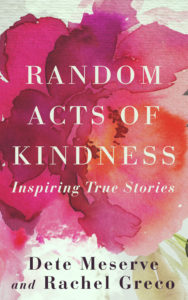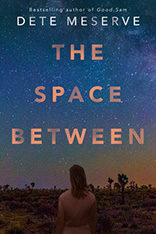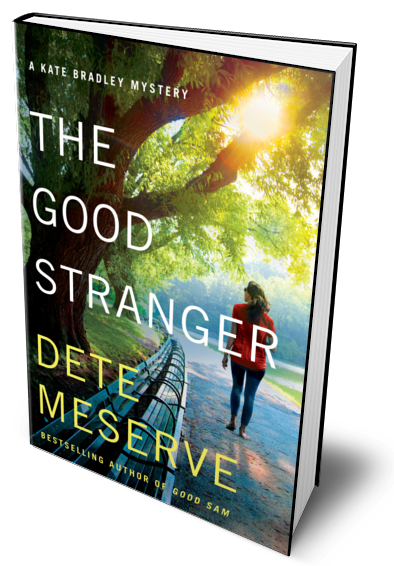Dete loves Zooming with book club groups. If you would like to arrange this for your book group, send her a note via the form on the contact page. Be sure to include the date and time of your meeting (including your time zone) and the book that you would like to discuss.
Discussion Guides are available for the following books. Click on the guide to see the questions.
Book Club Questions
 The Good Stranger
The Good Stranger
SPOILER ALERTS. Book Club Questions contain spoilers for the mystery. Read only after you’ve read the novel.
1. When Kate discovers the balloons, flowers and gift cards all around Manhattan, her colleagues think it’s a scam, a marketing gimmick, etc. Kate thinks people are afraid of seeming naïve if they lean toward the positive. What do you think of Kate’s belief?
2. When people in New York start fighting over the gift cards left all around the city, the news media grabs hold of the story and makes it seem as though there is an “epidemic of bad people everywhere.” How does the media’s portrayal of the bad things people do affect how you perceive others?
3. When Kate confronts Raymond about his shouting in the hallway, she wonders if “beneath his shark persona, a goldfish might be underneath.” Do you think it’s true that “many people are reeling in pain, disappointment, and loss and hiding that behind tough exteriors?”
4. When someone breaks into and trashes Kate’s apartment, the event tests her belief that people are inherently good. Have you ever experienced a negative event that made you more suspicious and less trusting of others?
5. After Kate hears Jordan’s concern for Marie, she lets him go and doesn’t call the police, even though he had been stalking her and sending her threatening notes. Do you think she was right to have compassion for him here?
6. All of the Secret Four talk about a leap they took with Marie. Marie defines the leap as “something you do without knowing whether the outcome will be bad or good.” Have you ever taken a leap in your life? What happened? Were you surprised by the outcome?
7. When Marie’s flight was canceled and she looked at the stranded passengers, she thought “everyone here has it better than me” but learns that she’s wrong about that. Have you ever assumed someone is better off than you are only to realize they’re also struggling?
8. Marie asks the others to “take a leap into a larger life.” What do you think she means by “a larger life?”
9. Marie doesn’t want anyone to know who’s been behind all the good things happening around the city. She tells Kate, “Let them think it could be anyone. It could be the stranger they pass on their way into work. Or the woman behind the counter at their favorite store. Or the taxi driver who’s driving them home.” Why do you think Marie gives these examples instead of letting people know she and the others are behind it?
10. Why do you think Kate calls The Secret Four “the richest people in the world”?
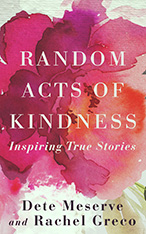 Random Acts of Kindness
Random Acts of Kindness
1. In Random Acts of Kindness, the Layaway Angel Cathy O’Grady says about her acts of kindness: “I get back more out of it than they do. I come to life.” Think back about something you’ve done for others. How did you feel? Did you get back more than you gave?
2. Writer Peter Reynolds says “There’s more good than bad in this world. More light than darkness and you can make more light.” Do you think this is true in your own life? How can you find ways to make this be true for you?
3. In Random Acts of Kindness, teen Max Loughan says he “wants to make the world a better place” through his inventions. Do you think it takes big inventions or big acts of kindness to make the world a better place? If not, what are small, everyday things you can do to make change?
4. Research shows that we may be “hardwired for good” which explains why some people feel “joy” or “lit up” when they help others. Have you seen this to be true in yourself? In others?
5. According to the Jewish philosopher and scholar Maimonides, the second highest form of charity is giving anonymously to another person so that you don’t know his identity and he does not know yours. Why is anonymity important in helping others? Are there times when it’s valuable for the recipient to know the identity of his benefactor?
6. In the Parable of the Good Samaritan (Luke 10:25-37), both the Priest and a Levite saw a beaten man at the side of the road and “passed on the other side.” Only the Samaritan stopped and bandaged the man’s wounds and took care of him. What are times in our own lives where we have been more like the Priest or the Levite and why? What are times in our lives when we’ve been more like the Samaritan? What prevents us from being more like the Good Samaritan and how can we overcome those challenges?
7. When we think about helping others through Random Acts of Kindness, who are the people who need help? Beyond the homeless and the poor, who else should we and can we help?
8. A man on the street asked a father and his son to give him money so he could buy medicine for his kids. The son thought the man was lying and would surely buy alcohol with the money instead. But the father decided to give the man the money, saying, “whether he was lying or not says something about his character but hearing someone in need and choosing not to help when I have the means, says something about mine.” What do you think about the father’s choice? Is it our responsibility to verify that our gifts of kindness are used according to our values? If so, then does this extend to other purchases and transactions in our lives?
9. In Random Acts of Kindness, the people behind Fill My Basket anonymously pay for groceries for people. Because they don’t know the people, they may sometimes pay for groceries for those who are not poor or needy. Yet they’ve discovered that even those who are financially okay also have worries, troubles, pain and suffering that often unseen by others. What do you think of their approach of providing truly Random Acts of Kindness to strangers?
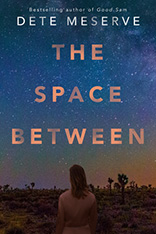 The Space Between
The Space Between
1. Sarah had a rocky relationship with Ben but never though he had the capacity to be a killer. What did you think of Ben’s character? How much do you think you know about the closest people in your life?
2. What did you think of Sarah’s attraction and kiss with Aaron? What do you think was the basis of the attraction?
3. What did you think about the connections between what Sarah observes in the starry heavens and what’s she feeling in her life? Were those passages meaningful to you?
4. A quote from the book: “In the universe, as in love, so many of our most important discoveries are made when we look past what seems to be true, when we find ways around our blind spots, and when we find new ways to see through darkness into the light” How is this true/not true in your own life?
5. The author wants to break stereotypes about women scientists and working mothers in this book. Do you think she achieved that? What stereotypes would you like to break?
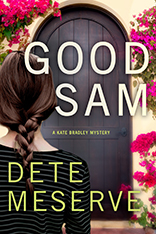 Good Sam
Good Sam
1. Good Sam has inspired people to think about the countless ways they can help others. How can we—with whatever resources we already have—be more generous to those we love, as well as the needy? How can we be Good Sams ourselves?
2. [Spoiler Alert] Good Sam Eric Hayes gave the money to five people who made a profound difference in his brother’s life. Who are the people who—through actions both big and small—have made a difference in your life? If you had more resources (time, money, etc.), how might you help them?
3. [Spoiler Alert] Good Sam Eric Hayes gave away $500,000 out of grief at the loss of his brother, whom he failed to rescue in a tragic accident. What are ways that grief can inspire us to treat others differently or make changes in our own lives?
4. When people perform acts of kindness for others, they often report that they receive more than they give. Has this been true for you? If so, when? Is it possible we are hardwired to get pleasure from helping others?
5. In the Parable of the Good Samaritan (Luke 10:25-37), both the Priest and a Levite saw a beaten man at the side of the road and “passed on the other side.” Only the Samaritan stopped and bandaged the man’s wounds and took care of him. What are times in our own lives where we have been more like the Priest or the Levite and why? What are times in our lives when we’ve been more like the Samaritan? What prevents us from being more like the Samaritan and how can we overcome those challenges?
6. According to the Jewish philosopher and scholar Maimonides, the second highest form of charity is giving anonymously to another person so that you don’t know his identity and he does not know yours. This is what Eric Hayes does in Good Sam. Why is anonymity important in helping others? Are there times when it’s valuable for the recipient to know the identity of his benefactor?

